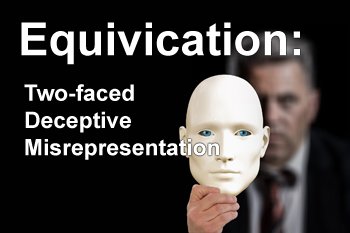Three Questions
Evolution Never Happened | See All The Videos. Go to the: 30 Second Video Menu

We should have started with the same question we asked believers in evolution. If evolution is never happened (it didn't) then theistic evolution is also false (it is). Proving evolution is true is based on a logical fallacy called "equivocation." Equivocation means that the definition of a word is changed in the middle of the conversation, without people knowing the definition has changed. The word in this case is "evolution." Here's how it works:

The believer in evolution will say, "We see evolution happen in the laboratory. It's been observed happening. Evolution is a proven fact."
Definition #1 (first and second sentences above) - evolution in the laboratory is defined as change, such as speciation (a new species being observed)
Definition #2 - (third sentence above) evolution is defined as all life having a common ancestor
These two definitions are very different. Proving that the information in DNA changes (speciation) does not prove new kinds of organisms evolve into existence nor that we have a common ancestor. A new kind of organism evolving, or even partially evolving into existence (a transition) has never been observed.
The noted noted British zoologist and physiologist Dr. Gerald Kerkut, distinguishes between the two major definitions of "evolution."
“There is a theory which states that many living animals can be observed over the course of time to undergo changes so that new species are formed. This can be called the ‘Special Theory of Evolution’ and can be demonstrated in certain cases by experiments. On the other hand there is the theory that all the living forms in the world have arisen from a single source which itself came from an inorganic form. This theory can be called the ‘General Theory of Evolution.’ and the evidence that supports it is not sufficiently strong to allow us to consider it as anything more than a working hypothesis.”
Proving the General Theory of Evolution (GTE) requires more than proving things change. You must prove that new information, resulting in new characteristics, is created. AND, you must prove that life arose from non-life. Both of these have been demonstrated to be impossible. (Watch some of our other videos here, here, and here.)
QUESTION #1 - How do you know what in the Bible is true, and what is myth or allegory? How do you determine when a plain, literal reading of scripture is not the correct way to read scripture?
To claim God used evolution as His "creative" means, requires denying a plain, straightforward reading of Genesis chapter 1. It cannot be understood to mean what it says, even though the style of writing is that of a historical narrative. If we are to take Genesis 1 to be something other than historical narrative, at what point in scripture do we start taking the Bible to mean what it says? Are there other parts of scripture that does not mean what it says? If so, how do we know which parts of scripture we are to understand literally and which requires a non-literal interpretation?
The Biblical answer to this question is that we understand the Bible based on how the original writers intended for it to be understood. For Hebrew scholars there are easily distinguished styles of writing such as historical narrative, poetic, and apocalyptic. Historical narrative (Genesis 1 for example) requires a straight forward, literal reading. Poetic writing (Job 38 for example) requires an understanding that it should not be read literally. For example, Job 38 is not intended to describe creation, it is God describing who He is. In addition, as with other types of literature the Biblical writers use many types of literary forms such as simile, metaphor, hyperbole, idiom and personification. We need to be able recognize these, just as we recognize them in contemporary writing.
Humanists love to attempt to "trap" Christians in supposed contradictions by misusing the term "literal reading." We need to understand what "literal reading" means. It can mean, as it does for Genesis 1, a straightforward reading taking scripture to mean exactly what it says. But "literal reading" also means to take scripture the way it was intended to be read. We are to understand hyperbole to be hyperbole, metaphors to be metaphors, and poetry to be poetry.
QUESTION #2 - Is there anything you would accept as proof God created everything in six days?
My experience has been that many theistic evolutionists answer this question the same way humanists do. They will avoid the question by saying, "All of the evidence proves evolution to be true." But when you ask them for something specific, if you get an answer, it will most likely be based on equivocation (see above). Another path theistic evolutionists follow is to directly jump into the claim that the word "day" does not mean a 24 hour day, and they try to show that Genesis 1 is talking about long ages. But, that does not work. For example, the order in which evolution supposedly brought things into existence is totally different from what is described in Genesis. You've got to pick one or the other, and supporting evolution as being true is going against what God says He did.
QUESTION #3 - If humans evolved from a common ancestor with apes, why are apes in zoos and humans are not?
For a theistic evolutionist there is no answer to this question that does not destroy scripture.
The answer is that humans are created in the image of God, and apes are not.
Then God said, “Let Us make man in Our image, according to Our likeness; and let them rule over the fish of the sea and over the birds of the sky and over the cattle and over all the earth, and over every creeping thing that creeps on the earth.” God created man in His own image, in the image of God He created him; male and female He created them. - Genesis 1:26-27
If we evolved from apes, did we then evolve the image of God? No. Did God at some point as we evolved, infuse His image into us? Nope. The Bible doesn't say that. It says God created man in His image. Was there a point in evolution at which a baby ape was born and that baby was the first to have the image of God, making it human. But wait, there'd have to be two, otherwise humanity could not procreate. A plain reading of Genesis tells us that God created everything in six days, creating humans on the sixth day in His image.
Ten Dangers of Theistic Evolution (CIM)
Biblical Problems for Theistic Evolution and Progressive Creation (AIG)
Theistic Evolution: What’s Wrong With the Idea That God Used Evolution to Create Everything? (GA)
Can Theistic Evolutionism Explain the Origin of Morality? (AIG)

Many people, when they die, will stand before Jesus and say:
Lord, Lord, did we not prophesy in Your name, and in Your name cast out demons, and in Your name perform many miracles? - Matthew 7:22
And Jesus will say to them:
I never knew you; depart from Me, you who practice lawlessness. - Matthew 7:23
Get your Bible out and read Matthew 7:21-23. These are some of the most frightening verses in the Bible.
They describe people who believe with all their heart that they are saved. They have no doubt that they know Jesus and they've done many great things that prove this is true. Put Jesus says, 'Depart from me...' He doesn't know them.
Are you truly trusting Jesus? Scripture says to examine yourself to see if you are in the faith (2 Corinthians 13:5). Have you done that?
Do you read your Bible regularly? Do you fear false teaching? Are you growing in your obedience to God? Are you growing in your understanding of what God wants? Do you regularly share the good news about Jesus with others?